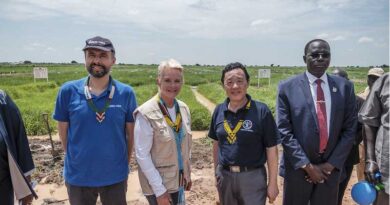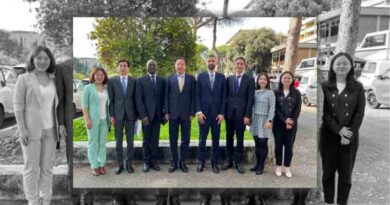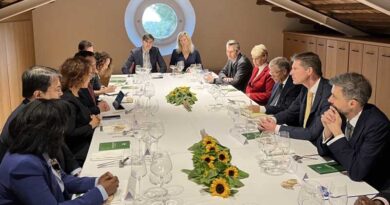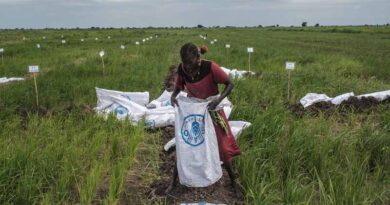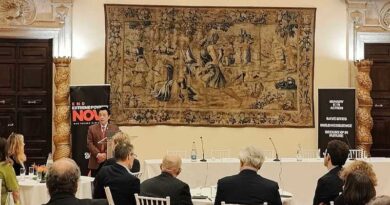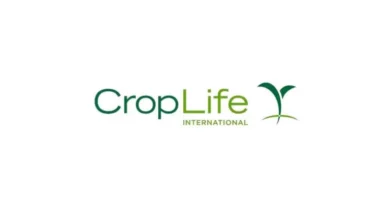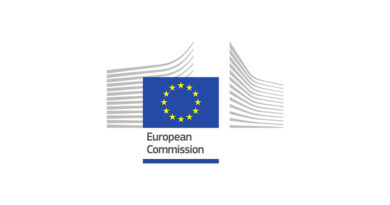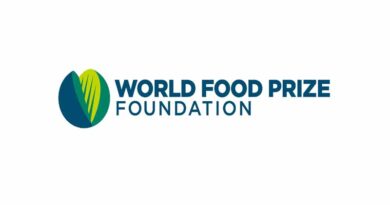In South Sudan visit, the Director-General bolsters FAO’s partnership with IFAD and WFP as his second term in office begins
02 August 2023, Juba: QU Dongyu marked the first day of his second term as FAO Director-General during his visit to South Sudan together with the Principals of the other two Rome-based agencies, the International Fund for Agricultural Development (IFAD) and the World Food Programme (WFP), to view first hand the implementation of joint projects on the ground.
During the joint visit, the RBA Principals signed a Memorandum of Understanding (MoU) through which the FAO Director-General, IFAD President Alvaro Lario and WFP Executive Director Cindy McCain committed their respective organizations to strengthen their collaboration on the ground.
Qu highlighted the importance for the Rome-based UN food and agriculture agencies of jointly developing, at an early stage, holistic plans and then optimizing the implementation of projects and programmes through each agency’s comparative advantages.
“We need to work together to focus on supporting concretely those populations who are most in need. There is a high potential to support them increase production and to contribute to the transformation of agrifood systems,” the FAO Director-General said.
The MoU outlines six thematic areas in which the three agencies agree to enhance collaboration: agrifood systems; nutrition; gender equality and women’s empowerment; resilience building; youth; and climate change, environment and biodiversity.
It also states that the agencies’ collaborative efforts will be underpinned by science and innovation; strong data and analysis; knowledge sharing; awareness raising; and joint resource mobilization, communication and advocacy.
South Sudan visit
The Principals of the three agencies met with the President of South Sudan, Salva Kiir Mayardit, to discuss further strengthening the ongoing collaboration. They also issued a global call for greater investments in South Sudan to avoid a catastrophic food crisis, and carried out field visits to projects showcasing their work in the country.
In 2023, FAO and South Sudan marked 10 years of cooperation since the country became a Member of the Organization, and during which time FAO’s presence has grown significantly with over 14 field offices and 348 staff.
In Juba, the leaders of the three agencies also met with representatives of the donor community where Qu reiterated FAO’s readiness to continue to support Members to achieve the 2030 Agenda, in line with the FAO Strategic Framework 2022-31, building upon the broad consensus achieved at the recently concluded 43rd Session of the FAO Ministerial Conference which approved an increase to the Organization’s budget level for the first time in twelve years; and well as a strengthened action on integrated water management. The Director-General also referred to the recent United Nations Food Systems +2 Stocktaking Moment which renewed the momentum for the transformation of global agrifood systems through the implementation of National Pathways.
The Director-General also briefed the donor community on the annual World Food Forum whose flagship event will be held at FAO’s headquarters on 16-20 October 2023, and also the FAO Hand-in-Hand Initiative for which South Sudan is a priority country.
The Director-General’s second term in office
Qu was re-elected with overwhelming support to a second term as Director-General and his new term runs from 1 August 2023 to 31 July 2027.
During his second term, the Director-General has pledged to pursue core initiatives that he started during his first term, including the Hand-in-Hand Initiative that supports the implementation of nationally-led, ambitious programmes to accelerate agrifood systems transformations.
Other priority areas of work include the Green Cities Initiative focused on improving the resilience of urban food systems, and the 1000 Digital Villages Initiative that promotes digitalization in rural areas to boost income and livelihood opportunities to benefit local communities.
In addition, the Organization will continue implementing the One Country One Priority Product programme, which helps countries leverage their potential by identifying special agricultural products; and Blue Transformation will also remain central for bolstering aquatic food systems to meet the growing demand for increased and improved dietary nutrients for all, while ensuring a climate-friendly and low-carbon approach.
Also Read: Oil Dispersion Formulations: A Game-Changer for Sustainable Agriculture
(For Latest Agriculture News & Updates, follow Krishak Jagat on Google News)


